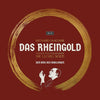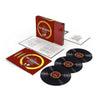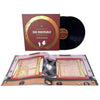





Wagner - Das Rheingold - Sir George Solti (3LP, Coffret, Half-speed Mastering)
Richard Wagner - Das Rheingold, WWV 86A
Oda Balsborg - soprano (Woglinde)
Hetty Plümacher - soprano (Wellgunde)
Gustav Neidlinger - bass-baritone (Alberich)
Ira Malaniuk - mezzo-sprano (Flosshilda)
George London - bass-baritone (Wotan)
Claire Watson - soprano (Freia [Holda])
Walter Kreppel - bass-baritone (Fasolt)
Kurt Böhme - bass (Fafner)
Set Svanholm - tenor (Loge)
Kirsten Flagstad - mezzo-soprano (Fricka)
Paul Kuen - tenor (Mime)
Eberhard Wächter - bass-baritone (Donner)
Waldemar Kmentt - tenor (Froh)
Wiener Philharmoniker
Sir Georg Solti, conductor [click here to see more vinyl featuring Georg Solti]
3 LPs, Box set with booklet
Original analog Master tape : YES
Half-speed Mastering
Heavy Press : 180g Virgin vinyl
Record color : Black
Speed : 33RPM
Size : 12'’
Stereo
Studio
Record Press : Optimal Media (Germany)
Label : Decca
Original label : Decca
Recording location: Sofiensaal, Vienna, September & October 1958
Produced by John Culshaw
Cut at Half-Speed by Miles Showell at Abbey Road Studios!
Originally released in 1959
Reissued in October 2022
Tracks :
Side A:
Side B: SCENE II
- Wotan! Gemahl! Erwache!
- Sanft schloß Schlaf dein Aug'
- Zu mir, Freia!
- Endlich, Loge!
Side C:
Side D:
Side E : SCENE IV
- Gezahlt hab'ich: nun laßt mich ziehn!
- Bin ich nun frei?
- Fasolt und Fafner nahen von fern
- Gepflanzt sind die Pfähle nach Pfandes Maß
- Weiche, Wotan, weiche!
Side F: SCENE IV (continued)
- Geheimnis-hehr
- Hört, ihr Riesen!
- Schwüles Gedünst schwebt in der Luft
- Abendlich strahlt der Sonne Auge
- Rheingold! Rheingold!
Review:
“A few conductors have perhaps equalled Georg Solti in their conducting of Richard Wagner's baton-breaking Der Ring des Nibelungen—Karl Böhm, Daniel Barenboim, Herbert Keilberth, and Reginald Goodall have all had coherent visions of the work which they were able to translate effectively to disc. But no one has ever equalled what Solti, producer John Culshaw, and what looks increasingly like a hitherto unsuspected golden age of Wagner singers, together accomplished: what is still the recording art's crowning achievement. No one has bettered Solti's London/Decca Ring in terms of sweep, scope, grandeur, dramatic immediacy, and sheer adrenalin. His Ring was the first in stereo and the first recorded in the studio. Four decades after its first notes were laid down on tape, it also remains Solti's greatest accomplishment.
(…) The orchestration is appropriately heavy and thick, the score weighted toward timpani and the lowest ranges of the trombones, contrabass trombone, bass tuba, and double basses. The brass are now warmer, more true, but most pronounced are the differences in the lower midrange.
(…) James Lock has done an outstanding job of re-remastering one of the greatest recordings of all time. I applaud his sensitivity and restraint.” Richard Lehnert, Sterophile, November, 2012
Half-speed mastering
In half-speed mastering, the whole mastering process is slowed down to half of the original speed. A typical 33 1/3 rpm record is cut at 16 2/3 rpm. The source material is also slowed down (reducing the pitch in the process) meaning the final record will still sound normal when played back. Slowing the whole process down allows more time, which means the end result sounds better and is more efficient — allowing engineering to minimize the effects of inherent limitations within the vinyl format. The result is a more accurate and more open high-frequency response in the half speed vinyl when compared with a normal speed recording.
Ratings:
Discogs : 4.51 / 5


